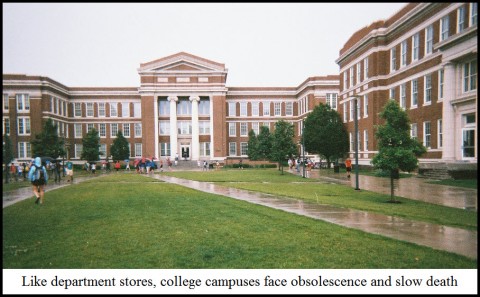 Is it possible that wage inflation is re-emerging in the U.S. after a 35-year hiatus? That’s what the experts seem to believe, but there are good reasons to think they will be wrong. Consider the substantial pay increase that minimum-wage workers received in many cities and states where this issue was on the ballot in November. In theory, they will have more money to spend, and this will push the prices of goods and services higher. In practice, because their employers, particularly those in the fast food business and brick-and-mortar retail, are in a last-ditch fight for survival, it is far more likely that a vast number of low-wage jobs will be eliminated. Even now, we are seeing workers who received raises in 2017 ask their employers to reduce their hours so that they can continue to qualify for food stamps and Obamacaid. This is the reality of the minimum wage world, and arbitrarily boosting hourly pay to $15/hour will only make things worse — for employers and employees. At best, the economic result will be a push, with the broad benefits of higher wages offset by a reduction in entry-level and low-paying jobs. In any event, the day is surely coming when McDonald’s will be able to operate a busy franchise with just two or three employees behind the counter. Amazon is already making similar strides in the grocery-store business. And Uber, having already made taxicab medallions worthless in many cities, could someday displace half the taxi drivers in America with driverless fleets like the one they are testing in Pittsburgh.
Is it possible that wage inflation is re-emerging in the U.S. after a 35-year hiatus? That’s what the experts seem to believe, but there are good reasons to think they will be wrong. Consider the substantial pay increase that minimum-wage workers received in many cities and states where this issue was on the ballot in November. In theory, they will have more money to spend, and this will push the prices of goods and services higher. In practice, because their employers, particularly those in the fast food business and brick-and-mortar retail, are in a last-ditch fight for survival, it is far more likely that a vast number of low-wage jobs will be eliminated. Even now, we are seeing workers who received raises in 2017 ask their employers to reduce their hours so that they can continue to qualify for food stamps and Obamacaid. This is the reality of the minimum wage world, and arbitrarily boosting hourly pay to $15/hour will only make things worse — for employers and employees. At best, the economic result will be a push, with the broad benefits of higher wages offset by a reduction in entry-level and low-paying jobs. In any event, the day is surely coming when McDonald’s will be able to operate a busy franchise with just two or three employees behind the counter. Amazon is already making similar strides in the grocery-store business. And Uber, having already made taxicab medallions worthless in many cities, could someday displace half the taxi drivers in America with driverless fleets like the one they are testing in Pittsburgh.
Epic ‘Creative Destruction’
In such an environment, inflation driven by higher wages is most unlikely. Even if some workers are getting raises, how could this possibly translate into higher prices at a time when a $4 trillion retail economy is transitioning into a national network of Amazon warehouses? Even the trucks that deliver goods sold by Amazon will eventually be automated. There will be no department stores in ten years, leaving cavernous vacancies in the nation’s shopping malls. The malls will either be torn down, or they will be converted to low- and middle-income housing. How inflationary is that? Meanwhile, even those hitherto intractable engines of inflation — college tuition, health care and government — are about to get crushed by deflationary forces. Colleges are becoming increasingly irrelevant to the jobs picture, and their brick-and-mortar infrastructure faces the same fate as department stores. That they have been successful until now at extorting students and parents for spiraling tuition charges is attributable solely to a student loan system that will someday be dragged into bankruptcy. (Or are we to believe instead that graduates who cannot find good jobs and who are living with their parents into their thirties will somehow be able to pay off $1.4 trillion in loans?). On the healthcare front, to pay for a delivery system that is as corrupt and inefficient as Big Government itself, Obamacare would tax into penury a middle class that is already going bankrupt and which has almost nothing socked away for retirement. Make no mistake, Trump was elected mainly to deal with such huge drains on America’s productivity and capital. And so he shall, deflating away waste in an era of epic ‘creative destruction’. It will be more than merely painful, and Trump will get the blame. In fact, he will merely have hastened a correction of economic excesses and government waste that have been accumulating for 50 years.

It seems to me there’s only a couple ways out of this mess, on your knees in prayer and “Energy”-most likely both. With low-cost energy mountains can be moved that could never may have seen the light of day.
Energy puts people on an even keel, as the odds against them to compete diminish exponentially. Man has to change from a consumer to a partner in earths management. This means more selfless acts then of self acts. Like the tribes of the past, we only take what we need and we work with nature to provide for all.
Life wasn’t created just so we could have a lot of stuff, more stuff than everybody else. If you live long enough you’ll see beyond the illusion.
May God have patience.